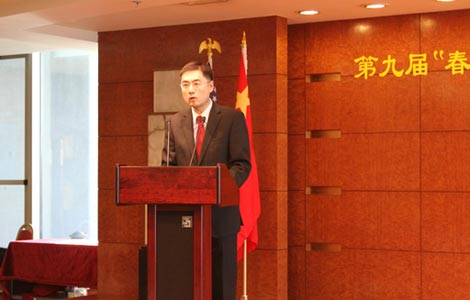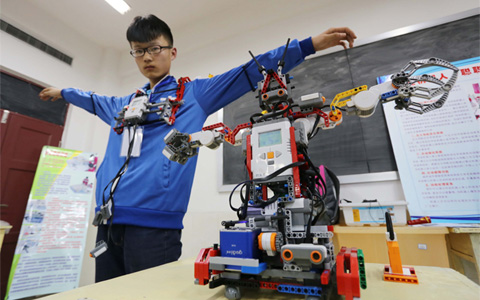Workers continue strike over unpaid welfare benefits
Updated: 2014-04-23 07:43
By He Dan in Beijing and Li Wenfang in Dongguan, Guangdong (China Daily)
|
|||||||||
The manufacturer has more than 100,000 employees on the Chinese mainland. Most of the workers in Guangdong, Hubei and Jiangxi provinces are on strike, a worker said.
But a Yue Yuen security worker said production remains interrupted.
Most workers that China Daily interviewed near the factory gate in Dongguan said they were not impressed by the remedies offered by Yue Yuen.
"I don't buy it," said Peng.
"The lease of the factory will end in May 2015. What if the company's owner chooses to close the factory and leave?"
Huang Zuowen, who has worked for Yue Yuen for 18 years, said he wants the company to be more transparent in its decision-making process.
An executive from a large footwear company in Dongguan who would not be named, said the strike at Yue Yuen shocked many local manufacturers.
He admitted that many labor-intensive companies fail to pay worker's social security in full, partly due to the huge operational pressure from rising labor costs and thin profits.
"And many workers choose to get cash instead of asking the company to put the money into their social security accounts, as they care less about the future."
Zhang Zhiru, a labor rights activist and director of the Shenzhen Chunfeng Labor Disputes Services Center, said the remedy plan failed to meet the expectations of workers.
A team of labor rights activists headed by Zhang talked with about 50 worker representatives on Monday night and they demanded that the company give a detailed plan to pay off the social insurance arrears.
They suggest, among other things, that the company should give every employee a 30 percent raise instead of a monthly subsidy of 230 yuan.
Wang Xiaofeng, the publicity director of the All China Federation of Trade Unions, said conflict between workers and employers is not unusual.
Wang said the federation has been working on improving trade unions' abilities to better protect workers' rights in line with the law.
Yoon Youngmo, senior specialist in industrial relations from the International Labor Organization's Office for China and Mongolia, said, "No one seriously questions that the number of collective labour disputes has gone up dramatically in the last 15 years."
He said industrial upgrading in China will involve a shift from low-wage industries and the process will inevitably affect workers' rights.
"It is important to assist workers to be part of the change," he said.
He added that some of the recent strikes in China have been in response to changes in companies such as closures, new owners and relocations, and these changes affect workers as a whole.
Jiang Ying, a labor law professor at the China Institute of Industrial Relations, said the new generation of Chinese workers has increased awareness of rights and higher expectations of an equal relationship with employers.
"The practice of making less than full payments was not regarded as a problem for workers in the past, but now it is for young workers born in the 1980s and 1990s," she said.
Zhang Yu'an and He Baoqi contributed to this story
Contact the writers at hedan@chinadaily.com.cn and liwenfang@chinadaily.com.cn

 First Tesla luxury sedans arrive in China
First Tesla luxury sedans arrive in China
 In this year's Boston Marathon, everyone's a winner
In this year's Boston Marathon, everyone's a winner
 Innovation competition kicks off in New York
Innovation competition kicks off in New York
 Automatic response
Automatic response
 Public figures give thoughts on World Book Day
Public figures give thoughts on World Book Day
 Dignitaries and royals raise ecological awareness
Dignitaries and royals raise ecological awareness
 Apple goes green to mark Earth Day
Apple goes green to mark Earth Day
 Beijing Auto Show – models backstage
Beijing Auto Show – models backstage
Most Viewed
Editor's Picks

|

|

|

|

|

|
Today's Top News
Slower growth poses challenges: AmCham
New investment rules open doors
Tesla luxury sedans arrive in China
Lenovo plans sales of 100m smartphones
Pact to reduce sea conflicts
In this year's Boston Marathon, everyone's a winner
Innovation competition opens in NY
Composer lauds classical music in era of pop songs
US Weekly

|

|








